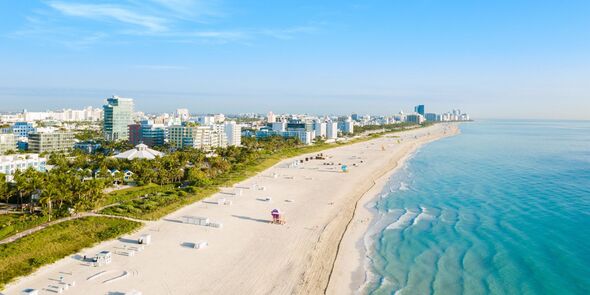World
Miami: A Beach Paradise Faces Tourist Overload Challenges

Miami, Florida, has been recognized as one of the world’s premier beach destinations, renowned for its stunning coastline, vibrant culture, and three main beaches: North Beach, Mid Beach, and the iconic South Beach. In 2023, the city was awarded the title of North America’s leading beach destination at the World Travel Awards, solidifying its status as a must-visit locale.
With its picturesque Atlantic Ocean views and pristine sandy shores, Miami attracts approximately 28 million visitors annually, representing about 20% of Florida’s total tourism. South Beach, known for its lively atmosphere and bustling beachfront, stretches nearly 10 blocks between 5th and 15th streets. Here, visitors can enjoy crystal-clear waters and the historic backdrop of Ocean Drive, famous for its vintage-style hotels, bars, and restaurants.
For those seeking a quieter experience, North Beach offers a more relaxed alternative. Travel experts at Inspiring Travel encourage visitors to immerse themselves in Miami’s rich cultural scene when not lounging on the beach. They suggest exploring the vibrant street art at Wynwood Walls, wandering through the lush gardens of the Vizcaya Museum, or checking out contemporary pieces at the Pérez Art Museum. The city’s culinary scene, influenced heavily by Latin American and Caribbean flavors, promises an exciting array of fusion cuisine.
The cultural diversity in Miami is distinctive, with a blend of Cuban and Latin American influences. Spanish is commonly spoken alongside English, creating a unique atmosphere that enriches the visitor experience. In addition to its cultural offerings, the city has become a hub for sports enthusiasts. Events such as a new Formula 1 race, Lionel Messi’s recent signing with Inter Miami, and various American sports teams have contributed to the influx of tourists.
Despite its accolades, Miami’s popularity has led to significant challenges. In 2019, Miami Beach welcomed over 7.4 million overnight visitors, contributing an estimated $22 billion to the local economy, according to government figures. This surge in tourism has raised concerns among residents, prompting calls for stricter regulations. Some locals are advocating for tighter controls on party-goers, seeking to introduce curfews and restrictions on loud and disruptive behavior.
The spring break season has particularly highlighted these challenges as thousands of students flock to the beaches for festive celebrations. Local authorities have begun implementing measures to manage this influx, including restricting access to certain areas, enforcing limits on loudspeakers, and establishing curfews on specific beaches.
Zeke Sabi, a spring breaker from Knoxville, Tennessee, expressed surprise at the new restrictions, stating, “I thought we were just gonna come out here and have fun and do whatever we want to just because it’s spring break, but I guess there are a couple of rules.”
As Miami continues to balance its appeal as a tourist hotspot with the needs of its residents, the city faces the challenge of maintaining its vibrant culture while ensuring a pleasant experience for both visitors and locals alike. The dialogue around tourism management is vital as Miami strives to preserve its status as a leading global destination.
-

 Health3 months ago
Health3 months agoNeurologist Warns Excessive Use of Supplements Can Harm Brain
-

 Health3 months ago
Health3 months agoFiona Phillips’ Husband Shares Heartfelt Update on Her Alzheimer’s Journey
-

 Science2 months ago
Science2 months agoBrian Cox Addresses Claims of Alien Probe in 3I/ATLAS Discovery
-

 Science2 months ago
Science2 months agoNASA Investigates Unusual Comet 3I/ATLAS; New Findings Emerge
-

 Science1 month ago
Science1 month agoScientists Examine 3I/ATLAS: Alien Artifact or Cosmic Oddity?
-

 Entertainment5 months ago
Entertainment5 months agoKerry Katona Discusses Future Baby Plans and Brian McFadden’s Wedding
-

 Science1 month ago
Science1 month agoNASA Investigates Speedy Object 3I/ATLAS, Sparking Speculation
-

 Entertainment4 months ago
Entertainment4 months agoEmmerdale Faces Tension as Dylan and April’s Lives Hang in the Balance
-

 World3 months ago
World3 months agoCole Palmer’s Cryptic Message to Kobbie Mainoo Following Loan Talks
-

 Science1 month ago
Science1 month agoNASA Scientists Explore Origins of 3I/ATLAS, a Fast-Moving Visitor
-

 Entertainment2 months ago
Entertainment2 months agoLewis Cope Addresses Accusations of Dance Training Advantage
-

 Entertainment4 months ago
Entertainment4 months agoMajor Cast Changes at Coronation Street: Exits and Returns in 2025









